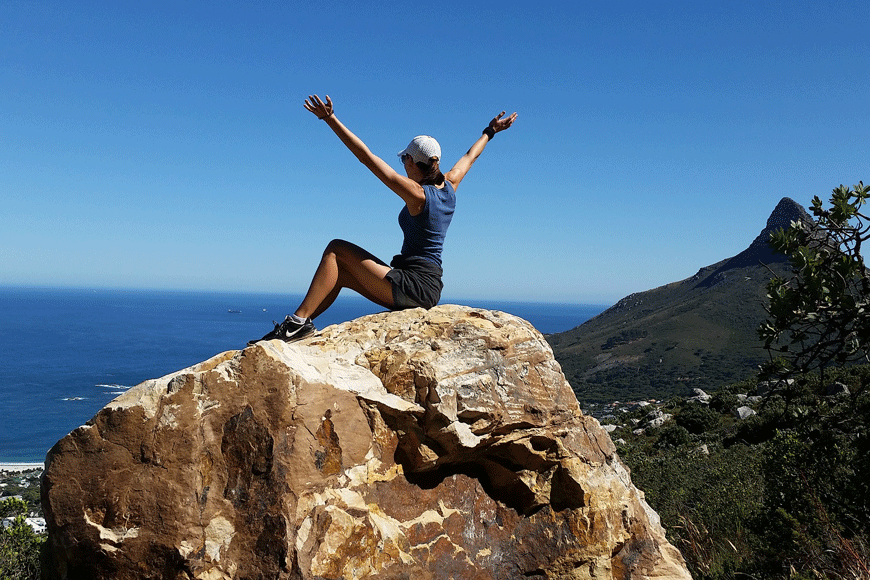Hiking is much more than a simple stroll through fields, orchards, forests and mountains. It's an adventure that requires good physical and mental preparation. Whether you're a novice or an experienced hiker, training for hiking can make all the difference between a memorable experience and an exhausting day out. In this article, we explore the different ways to plan your workout ahead of your hiking trip so that you can take full advantage of the beauty around you and not be too tired to notice !
Why should you train for a hike?
Training for hiking is essential for many reasons. It strengthens leg and body muscles, improves endurance and lung capacity, and prepares you for the physical and mental challenges of the trails. It also helps reduce the risk of injury for a safer, more enjoyable hiking experience.
When training for hiking: Start small, think big !
A training plan for hiking will definitely help you. If you're new to hiking, start with easy trails and gradually work your way up to more challenging routes. Begin with a half-day walk and build up to an all day trek, preparing a backpack to take with you for the day. This will also help you gain strength to carry weight on your back as you will be hiking from hotel to hotel with a small backpack every day. Walking on varied terrain, from gentle hills to steep mountains, will help you build muscle and endurance.
Some exercises for hiking
- Your legs are the driving force behind your walking. Strengthen them by incorporating exercises such as squats, lunges, calf raises and leg extensions into your training for hiking routine. You should also focus on strengthening your stabilising muscles for better balance on uneven paths.
- Hiking requires good cardiorespiratory endurance. Gradually build up your endurance through activities such as running, swimming, cycling or aerobics.
- Take regular walks to get your body used to long distances and changes in elevation. Start with short hikes and gradually increase the distance and difficulty over time so that you're ready for the long hikes of your trip.
- Training for hiking is also challenging yourself on uneven terrain. Work on your balance and coordination by incorporating stability exercises such as the plank, single-foot exercises and full-body stretches into your workout routine.
- Hiking can be as mentally demanding as it is physically. Practice relaxation and concentration techniques to stay calm and focused on the trails. Meditation, deep breathing and visualisation techniques can help you overcome mental obstacles and stay positive on a long hike.
- If you experience persistent pain or excessive fatigue, take a rest day. Overtraining can lead to injury and compromise your hiking enjoyment. Hence the importance of a well thought out training plan for hiking.
How long does it take to train to hike ?
It is best to start training for hiking as soon as you have confirmed your travel plans. The earlier you begin, the better because it takes time to train for hiking. If your deadline is short, start at least a few weeks before your departure. By making a training plan for hiking, you allow your body to adapt gradually to the physical effort involved. If you're a beginner or if you're planning a difficult hike, start to train several months in advance if possible, to give yourself time to develop your endurance and muscular strength.
How to stay safe and avoid injury on my trip ?
Avoiding injuries when hiking requires careful preparation and attention. Here are a few tips to minimise the risk of injury:
1. Before starting your walk, take the time to warm up by walking slowly and stretching to prepare your muscles and joints for the effort.
2. Wear hiking boots that fit properly and are adapted to the terrain you will be covering. Make sure your rucksack fits snugly and doesn't cause you any discomfort.
3. Drink enough water before, during and after your hike to avoid dehydration. Take snacks with you to maintain your energy levels throughout the walk.
4. Don't overload your rucksack. Carry only the equipment you need and distribute the load evenly to avoid unnecessary strain on the upper part of your body.
5. Stay on the marked paths to avoid getting lost or finding yourself in dangerous situations where you may need help.
6. Listen to your body and take regular breaks to rest and hydrate. If you have been training for hiking for a while, you will be familiar with what your body needs.
7. Check the weather forecast before setting off on your hike and turn back in the event of adverse weather conditions.
8. Use hiking poles to improve your stability and balance. Take care on steep, slippery or unstable ground.
Training for hiking : summary
To conclude, taking the time to train for hiking is essential if you are to make the most of this rewarding activity over the course of several days or even a week-long trip. By incorporating these tips into your training routine, you'll gain in strength and confidence and be ready to face whatever challenges nature throws at you. So lace up your hiking boots, get your walking poles at the ready and set off to explore the trails!




